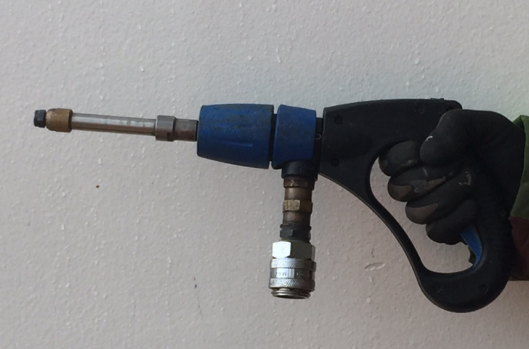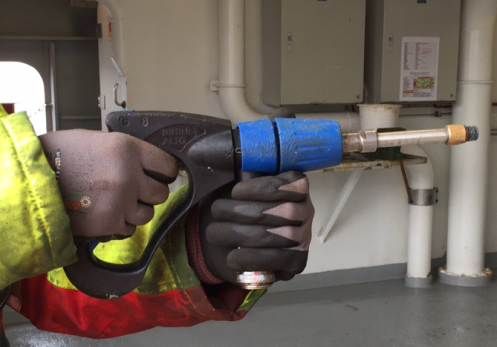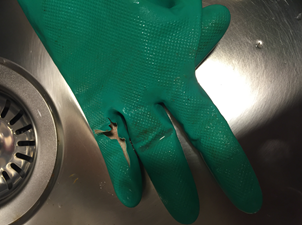Lost time injury (LTI): Serious hand injury during high pressure washing operations
A member has reported an incident in which a crewman was injured during high pressure jet-washing operations. The incident occurred during wash down operations inside a ballast tank. An able seaman (AB) sustained the injury as his finger was accidently positioned in front of the water jet nozzle. The subsequent hand injury required helicopter medivac to an onshore hospital for treatment. This resulted in a LTI.
During the operation, a 10cm (short) lance was in use. The high pressure washer being used at the time delivered 250 bar of water pressure. This instantly shredded the AB’s glove, causing a severe cut to a finger on his left hand. After localised treatment on-board and contact with shore-side medical doctor, it was decided to send the AB in for treatment at the hospital onshore via helicopter.



Our member’s investigation noted the following:
- The AB had been holding the water jet short lance with one hand only;
- The glove chosen for the job was a simple nitrile glove with no mechanical barrier towards cut resistance;
- The manufacturer of the short lance recommended two-handed use in their own safety precautions.
Direct causes to the incident were:
- Incorrect use of high pressure washer with a short lance;
- Inadequate personal protective equipment (PPE);
- Risk assessment was insufficient and did not capture the direct risks of using this type of lance;
- There were no clear written instructions available for using high pressure washer systems.
Our member drew the following lessons:
- The strong spray from a pressure washer can cause serious wounds that may first appear minor. Wounds that appear minor can cause a person to delay treatment, increasing risk for infection or disability;
- If the stream of water lacerates tissue, there is the risk of cleaning fluids being injected into the soft tissue;
- This type of operation is commonly seen as a ‘routine’ task performed on numerous occasions;
- An increased awareness is required at the risk assessment stage as well as in selection of adequate PPE for the task and training/awareness for operators. Our member held a full review of suitable PPE for the task and a review of the company risk assessments for high pressure washing operations.
- This incident could have been avoided with simple measures such as correct use of the tool, adequate PPE and appropriate training – as a result our member will implement formal training in the use of high pressure washers.
Members may wish to refer to the following incident (search words: jetting):
Safety Event
Published: 6 May 2016
Download: IMCA SF 12/16
IMCA Safety Flashes
Submit a Report
IMCA Safety Flashes summarise key safety matters and incidents, allowing lessons to be more easily learnt for the benefit of all. The effectiveness of the IMCA Safety Flash system depends on Members sharing information and so avoiding repeat incidents. Please consider adding safetyreports@imca-int.com to your internal distribution list for safety alerts or manually submitting information on incidents you consider may be relevant. All information is anonymised or sanitised, as appropriate.
IMCA’s store terms and conditions (https://www.imca-int.com/legal-notices/terms/) apply to all downloads from IMCA’s website, including this document.
IMCA makes every effort to ensure the accuracy and reliability of the data contained in the documents it publishes, but IMCA shall not be liable for any guidance and/or recommendation and/or statement herein contained. The information contained in this document does not fulfil or replace any individual’s or Member's legal, regulatory or other duties or obligations in respect of their operations. Individuals and Members remain solely responsible for the safe, lawful and proper conduct of their operations.
